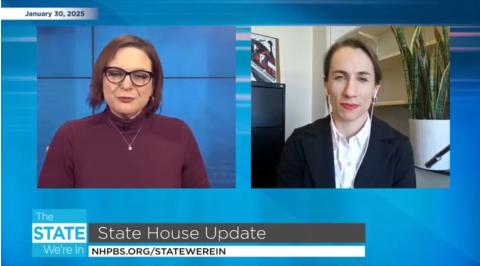NH PBS Interview: Rudman Center Director Anna Brown on Top Issues in the State Legislature and a ‘Very Uncertain Environment’ Amid Trump’s Executive Orders

State We're In host Melanie Plenda and Anna Brown, executive director of the Rudman Center.
As the new legislative session gets underway in New Hampshire, challenges include a budget deficit that has already prompted a hiring freeze on the state level. Meanwhile, the Trump Administration’s potential federal funding freeze has added a level of uncertainty that could hamper budget negotiations.
“It’s going to be a tough one. Governor Kelly Ayotte has already said, expect to tighten your belt,” said the Rudman Center’s Executive Director Anna Brown during an interview on the NH PBS program, The State We’re In. To watch the full interview, visit here.
Brown identified some of the top debates likely to play out in the state legislature in the coming months, including on bills addressing housing, school and curriculum policies, and immigration-related issues. Some bills revive former debates, including a parental bill of rights that would require teachers to respond to parents’ inquiries within a certain amount of time. A new school policy that’s been proposed would ban cell-phone use in the classroom during instruction time, with certain exceptions.
Immigration enforcement is a top priority for Governor Ayotte, Brown said. “She is looking to ban sanctuary cities in New Hampshire, which I don’t think is the most controversial immigration issue this year, because it’s not really common that you’re going to have a lot of tension between police and immigration and customs enforcement here,” she said. “Only a couple of cities or towns have ordinances that might fit under that category.”
One bill would ban any local ordinances or regulations that would prevent law enforcement from cooperating with immigration enforcement at the federal level, she said. Another invalidates out-of-state driving licenses issued to undocumented immigrants.
Budget challenges include declining business tax revenues and lawsuits related to school funding and abuse allegations at state-run youth detention centers. The Governor will submit her budget in the coming weeks.
“We already have a shoestring budget compared to a lot of other states. What’s going to get cut? Governor Ayotte has said that she’s very concerned about mental health, first responders and law enforcement, so we can presume she’s not going to be looking to make cuts there, but honestly anything else in state government is on the table.”
Although the Trump administration rescinded an order to freeze all federal funding, it has promised to continue reviewing federal funds and has indicated it still plans to issue restrictions.
“It’s a very uncertain environment and I think the challenge in New Hampshire is how do we plan for this going forward because there are big potential impacts on the budget. On the highest level, about one third of all of the revenue in the state budget comes from the federal government. That might go to roads or schools or contracts for community services,” she said. “And it’s worth noting that with our shoe-string budget, compared to other states, a lot of our social service programs, whether it’s an after-school program or a public health program, essential service for new mothers, or services for veterans, are coming from non-profits that get government contracts.”
A potential federal funding freeze could have a profound impact on these programs. “But since the landscape continues to change so much on a daily basis, we can’t be sure what ultimately is going to happen,” she said.
